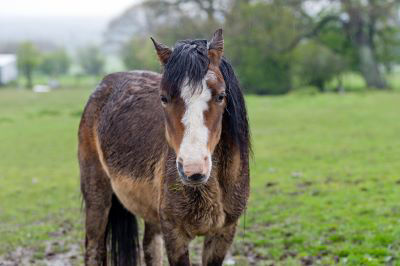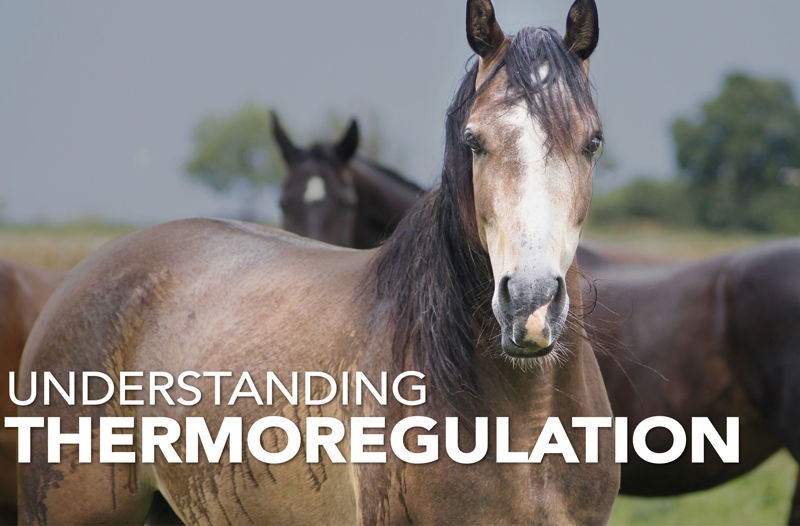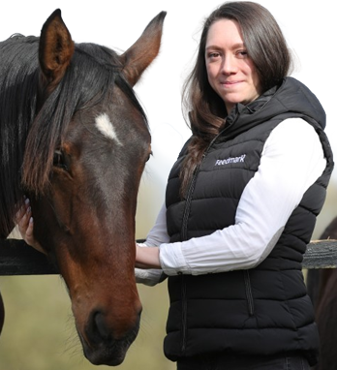Written by Stephanie Hyland (MSc. RNutr.).
Autumn and winter months bring cold and wet weather to the UK which means management and routine changes for our horses. With the temperatures dropping, worries about how to keep horses warm and how to prevent unwanted weight loss start to creep in.
Horses are mammals and like any other mammal, they are warm blooded which means that they have the ability to maintain their core body temperature despite changes in environmental temperatures and conditions. The key reason that horses have such a good ability to maintain their body temperature is because they are endothermic, meaning that they produce heat through metabolic processes.
Thermoregulation:
The process through which horses control their body temperature is called Thermoregulation – the maintenance of physiologic core body temperature through balancing heat generation with heat loss. Horses generate heat in their hindgut, which acts as an internal radiator through bacterial fermentation of the forage that they eat, keeping them warm from the inside out. Ideally all horses should be on a forage-based diet, where the majority of their intake is based on good quality long stem fibre. Horses who are not on a weight management diet should be fed between 2 – 2.5% of their body weight in good quality forage per 24-hour period.
The Thermoneutral Zone:
The Thermoneutral Zone (TNZ) is the range in which the horse can regulate its body temperature with little to no additional energy expenditure. For horses this is between 5oC – 25oC in mild climates, however when horses reach the lower critical temperature, an increase in metabolic heat production must occur to maintain body temperature. This requires additional energy so when temperatures drop below 0oC, additional forage should be provided to ensure adequate energy intakes which will be needed to compensate for a higher energy requirement to maintain body temperature.

When temperatures drop below 0oC, additional forage should be provided
The Thermoneutral zone for humans (lightly clothed) is 14.8oC – 24.5oC. There is a huge difference between the TNZ of horses and of humans, so it is important to remember this when considering if your horse is cold or not.
Preserving Body Heat and The Evolution of Horses' Winter Coat
Horses preserve their body heat by reducing blood flow to the skin’s surface (cutaneous vasoconstriction) and by piloerection which is where the hair stands up to create a layer of air which insulates by maintaining heat close to the surface of the skin. The skin, tissues, fat and hair all play a role in the horse’s ability to regulate their body temperature. Thermoregulation can be affected by age, breed, body condition, size and health status.
Horses have evolved to develop a thick winter coat which comprises of two layers of hair – longer guard hairs and finer hairs which act as an undercoat. The guard hairs help shed rain whilst the undercoat traps warm air to insulate the skin. This along with the natural oils in the horse’s coat will also help to ‘waterproof’ them making horses well adapted to winter conditions.

Horses and ponies have evolved to develop a thick winter coat
Should You Rug or Clip Your Horse in Winter?
If you are considering rugging or clipping your horse, remember the difference between their TNZ and ours. Horses do not feel the cold as we do so can easily be over rugged, leading to them over-heat which causes heat stress. Horses will sweat to cool down but sweat cannot evaporate from under a rug and will create a moist, warm environment which is ideal for bacterial growth and can lead to skin infections. It also takes more energy for a horse to cool down that it does to heat up, so an over rugged horse is likely to lose weight due to increased energy requirements to try to remain cool.
Overweight horses should be allowed to use their natural fat stored to stay warm, and careful consideration about whether rugging is necessary should be taken, especially if they are unclipped. Winter can be a good opportunity to help them safely lose weight.
Summary
Horses have a great ability to keep warm and un-clipped and un-rugged healthy horses will have no problem living out in lower temperatures if they have enough forage to eat and the choice of taking shelter is provided. Consideration of the weather and the individual horse does need to be made as wet and cold weather combined can be more challenging for horses to maintain their body temperature.
For any advice or questions you may have, please don't hesitate to reach out to our expert nutrition team. You can call 0800 585525 Monday-Friday 8:30am-5:00pm. Email [email protected], or send us a DM on social media.



